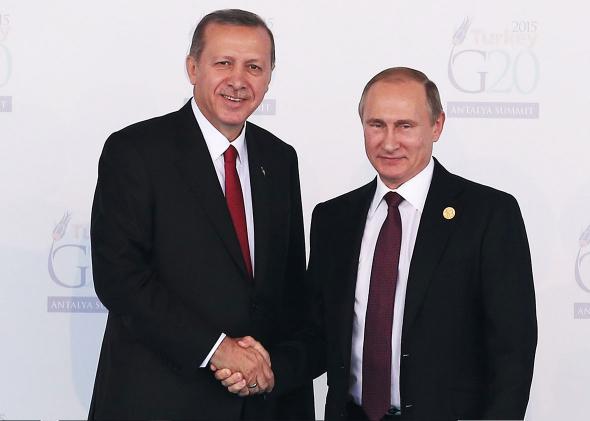Turkey’s downing of a Russian warplane over Syria shows what can happen when several nations take military action for divergent reasons on a small swath of land. It also underscores the urgency of negotiating a political settlement to the Syrian civil war—but intensifies the difficulty of doing so.
The aerial attack on Tuesday is a textbook case in point. Russia and Turkey would both like to see ISIS wiped out. But they’re more interested in the fate of Syrian President Bashar al-Assad, from opposite sides—Russia intent on propping him up, Turkey on promoting his ouster. Russian planes have dropped many more bombs on “moderate” anti-Assad rebels than on ISIS fighters. Recently, they’ve been bombing Turkmen militias in northern Syria, very close to the Turkish border. Turkey had written a letter to the U.N. Security Council last week warning that Russia’s operations could trigger a border incident—and, finally, they did.
Another twist in this tale, according to a senior American official: The Syrians who shot down the Russian pilots as they parachuted to the ground were fighters with the same Turkmen militia that the Russians had been bombing for days, sometimes with horrific weapons that burn victims’ bodies and collapse their lungs.
Details are still fuzzy on whether, or how often, Russian planes have crossed into Turkish airspace or to what extent the Turkish air force has sent warning signals. The senior U.S. official says the plane that was shot down Tuesday had crossed the border “very briefly,” for a few minutes or even seconds.
A month ago, shortly after two Russian planes crossed into Turkish airspace—one of them engaging in what a Pentagon official called “provocative” behavior, forcing the Turks to scramble their own fighter planes into the air—I wrote a column calling the situation a “tinderbox” that could ignite the region into war. I added:
What if this happens again and the Turks shoot down the Russian plane or the Russians shoot down a Turkish plane? Turkey is a NATO ally; it could invoke Article 5 of the North Atlantic Treaty and demand help from its allied nations. The possibilities of mistakes and miscalculations—or bizarrely intentional affronts—seem limitless.
Tuesday morning, at a press conference following their meeting in the White House, President Obama and French President François Hollande didn’t so much as mention the downing of the Russian fighter jet until a reporter asked about it. Even then, they made as little of the incident as possible, noting that the details were being investigated. Obama said he would ask Turkish President Recep Tayyip Erdogan about it “in the coming days;” Hollande said he would discuss it during his meeting this Thursday in Moscow with Russian President Vladimir Putin.
The point was clear: Neither president, nor any other sane leader, wants to go to war with Russia over this single, if unnerving, incident. Obama made the point explicitly: “My top priority,” he said, “is to ensure that this does not escalate.” He has good reasons. First (though he didn’t say as much), a brief aerial border crossing is no cause of war. Second (and he did make this point), Russia’s role is crucial in the settlement of Syria: The question is whether Putin will impede or promote that goal. There is—as Obama said—“a potential convergence of interests” between Russia and the West to promote it, so it’s worth trying to make that so.
And here is where Turkey’s downing of the Russian warplane could wreck that possibility. On Nov. 14, delegates from 20 countries—including Secretary of State John Kerry and the foreign ministers of Russia, Iran, Turkey, and Saudi Arabia—met in Vienna to discuss a political transition to a post-Assad Syria. Prodded by the ISIS-sponsored attack on Paris, which took place just hours before the conference, the group produced a formal statement calling for a transition process to begin on Jan. 1, followed by a cease-fire, with elections for a new Damascus government in 18 months.
There were holes in that diplomatic statement, not least this one: “The ceasefire would not apply to offensive or defensive actions against Da’esh [ISIS] or Nusra [an al-Qaida affiliate] or any other group the [conference of 20 nations at Vienna] agrees to deem ‘terrorist.’ ” (Italics added.) Even at the time, Russia and Iran said they considered all groups fighting in Syria, except for the Assad-backed Syrian army, to be terrorists. Now that the Turkmen militia—which calls itself the 10th Brigade and is associated with the Free Syrian Army, one of the U.S.-backed “moderate” rebel groups—has shot at Russian pilots as they helplessly parachuted to earth, Putin will likely be more insistent on this point. If that’s true, there will be no real cease-fire and thus no prospects of a political transition and thus no end to the war.
So with one stray stroke of violence, the chances of peace in Syria are diminished, and the chances that this multiplicity of wars might trigger mistakes, miscalculations, or affronts that spiral out of control are heightened. In fact, we’ve now seen a demonstration of this sort of incident, which was merely a hypothetical just a few weeks ago.
Will all the members of the potential anti-ISIS coalition step back, reassess the risks, and come together on a plan to cooperate, despite all odds—or will they remain a gaggle of disparate forces, not only incapable of fighting under a joint command but intent on fighting one another? The former can defeat ISIS handily; the latter—which ISIS counts on for its strength—will spawn only the stalemate of perpetual war or worse.
